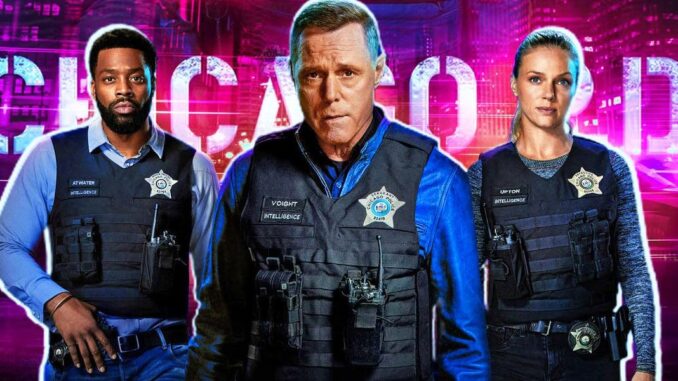
The Ghost in the Machine: When Hank Voight Took Root in Jason Beghe
The stage lights dim, the camera cuts, and the director yells “wrap.” For most actors, the persona they inhabit on screen dissolves with the day’s shoot, a costume hung up until the next call. But for a select few, especially those entrenched in long-running roles, the lines blur, bleed, and sometimes, even disappear. Jason Beghe, the gravel-voiced powerhouse behind Sergeant Hank Voight in Chicago P.D., stands as a profound testament to this phenomenon, openly acknowledging that he and his character are “deeply intertwined.” It’s a confession that offers a fascinating glimpse into the human cost and profound artistry of inhabiting a character for over a decade, illustrating how real life doesn’t just inform the fiction, but is irrevocably changed by it.
Imagine the genesis of Hank Voight. A hard-boiled, morally ambiguous police sergeant, Voight is a man carved from the grit and grime of Chicago’s underbelly, driven by a visceral sense of justice that often skirts the law’s edges. When Beghe first took on the role, he brought with him a distinctive physical presence: the formidable build, the intense, often unblinking gaze, and that signature, raspy voice. These weren’t just performance choices; they were inherent aspects of Jason Beghe. The casting itself was an acknowledgment that the actor possessed a raw, inherent gravitas that perfectly suited a character who operates in the shadows, making impossible decisions. In this initial phase, Beghe’s “real life” – his physical and vocal attributes, his personal intensity – was the fertile ground from which Voight sprouted. The actor wasn’t just playing Voight; he was lending himself to Voight, a fundamental infusion of his own being into the fictional construct.
But the real intertwining began as the seasons accumulated, stretching into over ten years of portraying a man who has experienced immense loss, enacted brutal justice, and lived with profound moral compromises. Picture the sheer emotional weight an actor must carry, day in and day out, channeling Voight’s grief over his son’s death, his fury at criminals, his fierce loyalty to his unit, and his constant battle against the darkness that threatens to consume him. This isn’t just acting; it’s a sustained empathy exercise, a continuous inhabiting of another’s psyche. It’s like wearing a second skin that, over time, merges with your own.
Beghe’s voice, for instance, has become virtually synonymous with Voight’s. What began as an actor’s natural vocal quality has, through years of delivering Voight’s guttural pronouncements, developed an even deeper, more resonant growl. One wonders if the very effort of constantly accessing Voight’s rage and world-weariness has physically altered Beghe’s vocal cords, or if the character’s psychological imprint has simply amplified an existing trait. It’s an illustrative example of the physical manifestation of this bleed, a testament to how the constant demand of a role can reshape even the actor’s physiology.
Beyond the physical, there’s the psychological osmosis. When Beghe speaks of being “deeply intertwined,” he hints at a profound shift in perspective. How does one spend over 10,000 hours navigating Voight’s morally grey universe without some of it clinging to their own worldview? Does Beghe find himself questioning everyday situations with Voight’s cynical eye, or feeling a flicker of Voight’s unwavering protectiveness? The constant immersion in a world where good and evil are murky, where the ends often justify the means, must inevitably leave a mark on the actor’s own ethical landscape. It’s not that Beghe becomes Voight, but that Voight becomes a potent filter through which Beghe may perceive the world, a phantom limb that still feels the phantom pains of its character’s experiences.
This deep intertwining is not merely a quirk; it’s the very source of the character’s authenticity and enduring appeal. We, as an audience, believe in Hank Voight because Jason Beghe so thoroughly inhabits him that the performance feels less like acting and more like revelation. The slight hesitations, the flashes of vulnerability beneath the hardened exterior, the moments of almost feral protectiveness – these aren’t just lines delivered; they are emanations from an actor who has allowed his own essence to be infused with his character’s, and vice versa. It’s the ghost in the machine, the human spirit so deeply invested in a fictional creation that the two become inseparable, a testament to the transformative power of art and the remarkable dedication of its practitioners.
Ultimately, Jason Beghe’s candid admission about his inextricable link to Hank Voight serves as a powerful illustration of the profound, often unacknowledged journey actors undertake. It’s a reminder that great acting isn’t always about disappearing into a role, but sometimes about allowing a role to take root so deeply that it forever becomes a part of you, a unique and complex tapestry woven from real life and compelling fiction. The lights may dim, but for Beghe, the ghost of Voight undoubtedly lingers, a testament to a career defined by an extraordinary, enduring bleed.
